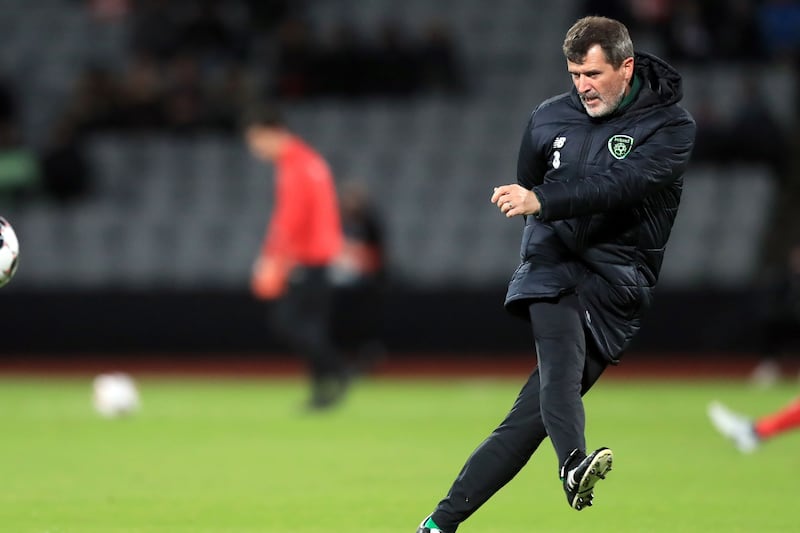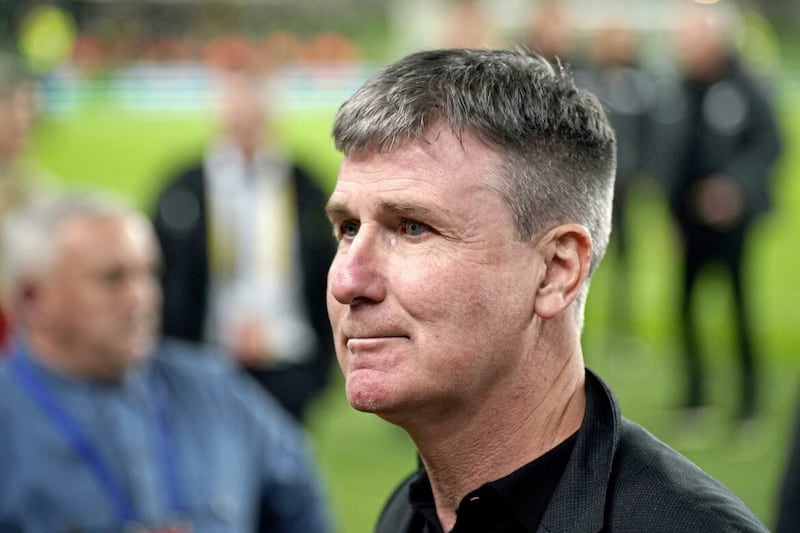2024 European Qualifying Group B: Greece 2 Republic of Ireland 1
FOR three years, we fell in love with the romantic notion that the Republic of Ireland could not only win football matches but win by playing the modern way.
Irish fans would break from their footballing traditions and embrace a new dawn.
For three years, virtually everyone was a Stephen Kenny disciple of trying to win another way.
Dissenters were treated indifferently; blessed are those who do not understand where Ireland were and where they needed to go.
For three years, the evangelists rationalised the losses and kept faith with the process. Things would eventually turn despite the in-game blips and nervy malfunctions along the way.
Even though France banked three qualification points in Dublin, Stephen Kenny’s men were canny, structured and brave back in March.
More building blocks. More hope.
Then, the Irish crashed and burned in the dead heat of Athens.
From France to Greece: how did it get to this? How could virtually the same group of players be so erratic between games?
For a good portion of Kenny’s reign, it has been a self-perpetuating two steps forward and two back.
But the Greece defeat was different. A shred of redemption couldn’t be found in the wreckage.
It felt like four or five steps back and reached the tipping point where faith in the process was lost.
The team’s preparation couldn’t have been any better. Back-to-back training camps, in Bristol and Antayla, to manage those dead weeks between the end of the club season and June international matches.
Injuries were kept to a bare minimum. The noises from the camp were good.
Asked if he felt Stephen Kenny could still lead the national team after such a devastating loss, Matt Doherty told reporters in the mixed zone: “Of course. We were prepared unbelievably well. They do everything for us. I was just saying behind the scenes, the staff, the manager, Keith [Andrews], ‘Sheasy’ [John O’Shea], ‘Deano’ [Dean Kiely], for me, they are absolutely the right people.”
The problem with Doherty’s analysis was that a host of Ireland players looked as though they hadn’t a leg beneath them in the OPAP Arena.
From the early stages of Friday’s ill-fated Euro 2024 qualifier, which all but extinguished the team’s chances of automatic qualification to the Germany finals next summer, they were fighting fires all over the field.
Terrible confusion down Ireland’s right side reigned in the first half, prompted by Greece’s clever switches of play to left back Kostas Tsimikas.
Will Smallbone, playing on the right of a narrow central midfield three, was forced to make countless shuttle runs out to try and counteract Tsimikas.
Adam Idah, inexplicably, moved to the left of central striker Evan Ferguson rather than planting himself on Tsimikas’s toes, if only to stem the tide until half-time and allow Ireland’s defence and midfield to function a bit better.
“We had the suspicion Ireland would play with two strikers,” said Greece manager Gus Poyet. “So, we put our players on their full-backs down the sides, and we could drag them one way and to switch to the other side and attack.
“It sounds very easy, but you have to do it in the game…but we were able to pin Ireland back. My players are understanding quickly, which I’m happily surprised about, whereas in a club it could take you six or seven months. It worked very well. It was important to get the goal because we could sit back and say: ‘Okay, so beat me now.’
The much-travelled Uruguayan was master of the technical area.
Callum O’Dowda was all at sea and at fault for Greece’s two goals, with the winger pulling off a poor impersonation of a full-back as he never got the opportunity to act as a wing-back.
Doherty and O’Dowda were occupied superbly well by Dimitris Pelkas and Giorgos Masouras throughout.
Tactically, Smallbone was caught between two stools. Josh Cullen and Jayson Molumby looked particularly out of sorts in the middle of the field, uncharacteristically passive, and rarely received passes from their defenders in order to build the play from the back.
“At this level if we’re not…how can I best put it,” said Cullen. “If the distances are too big and we are not doing things together and we get caught in between, then teams with players like that can punish you. We need to take responsibility for that, and we need to be better.”
Kenny was reluctant to revert to a flat back four and kept faith with three central defenders, none of whom were particularly comfortable moving into midfield with the ball to make angles and punch short passes into Cullen or Molomby, and allowed themselves to be occupied by just one Greek attacker.
“We haven’t played with a flat back four for a long time and until the advent of Mikey Johnston and natural wide players when one or two emerged,” a disconsolate Kenny said in the press room.
“There’s no doubt about it, we're disappointed. It was a harsh reality for some of the players, [they] played below their levels.
“That’s my responsibility. That’s my job to get them to the levels they need. So, we’re disappointed with that. It’s often been the case, at difficult away venues, where the home team will have a lot of the ball and exert pressure but you’ve got to find a way then to defend better, and that’s what probably killed us.
“If we saw off those two moments, we grow in the game and that’s what happens. Those key defensive lapses really got punished. Overall, in the previous game against France, we defended brilliantly for the whole match.”
But Ireland’s performance in Athens cut much deeper than a couple of “defensive lapses”.
The performance as a whole was arguably the lowest point under Kenny, and probably eclipsed the defeat to Luxembourg because Irish supporters quite rightly feel the team should be further down the developmental track by now.
The 51-year-old Dubliner has preached the importance of keeping possession and pressing high. They failed miserably in both areas against the Greeks, their style and approach completely indecipherable.
Doubts surrounding Adam Idah’s ability to gel with Evan Ferguson were borne out in glaring detail on Friday night. Michael Obafemi was always a better bet and was introduced with just nine minutes of normal time remaining.
Pundit Liam Brady might have overcooked his criticism of the current crop of Irish players – that they were the worst he could ever remember - but what can’t be overstated when you survey the manager’s resources is the distinct lack of leadership.
Nathan Collins and Gavin Bazunu were the only two that showed some big-game mettle. And while there were some tactical misgivings in Athens, nobody in an Ireland jersey was able to seize the initiative and problem-solve their way out a tactical headache.
Before the FAI press officer ended a rather sombre post-match press conference late on Friday, Kenny was asked about his future as senior manager.
“I hear what you’re saying,” he said. “I’m not concerned about myself at the moment. We have to get ready for Monday now, for the game against Gibraltar. It’s a game we have to win, and we have to make sure we’re ready.”
James McClean will win his 100th cap in Dublin on Monday night, but no-one’s in a celebratory mood.
Ireland’s competitive wins record under Kenny now stands at four in 23 games.
Results have never been the Dubliner’s friend in his three years at the helm – but faith in the process could always rationalise things.
Now that the process has run into trouble – so too has Stephen Kenny. It felt like the affable Dubliner was running out of road as everyone left the OPAP Arena in the wee small hours of Saturday morning.








